“He lay on the sidewalk, naming towns and cities in Ukraine”. A digest of anti-war activities in Russia, 23-29 July
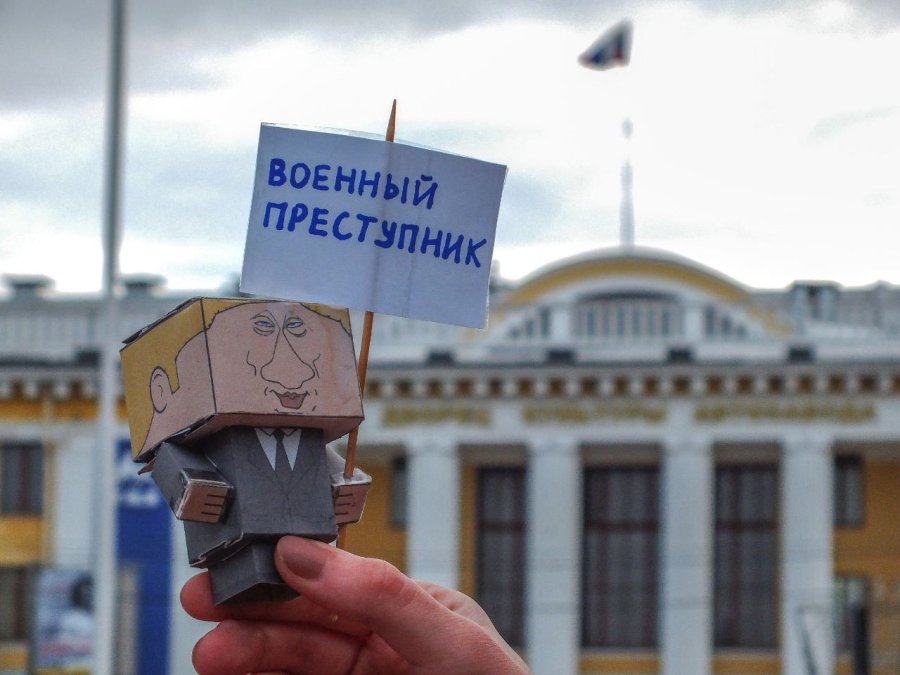
Opponents of the war in Chuvashia (Volga Federal District) have “crossed out” the ugly Z, symbol of war, in their capital Cheboksary with a white sash and the words “Kileishu means PEACE” (kileishu is the Chuvash word for peace).
The Z “sculpture” has stood in the centre of Cheboksary since the invasion of Ukraine by Russian forces. On two previous occasions (see 17-24 June Digest [E]) the sculpture has been attacked: on 6 April one of the city’s residents was fined for kicking the illuminated monument; and in mid-June two young men who broke the facade of the so-called sculpture were charged with vandalism.
See for details and photos here.

*
An unidentified artist in St Petersburg drew a crossword clue on the asphalt based on the Newspeak of the war in Ukraine. Social anthropologists Alexandra Arkhipova and Boris Iomdin have released a podcast about this clue: it’s called “How our Newspeak is constructed”.
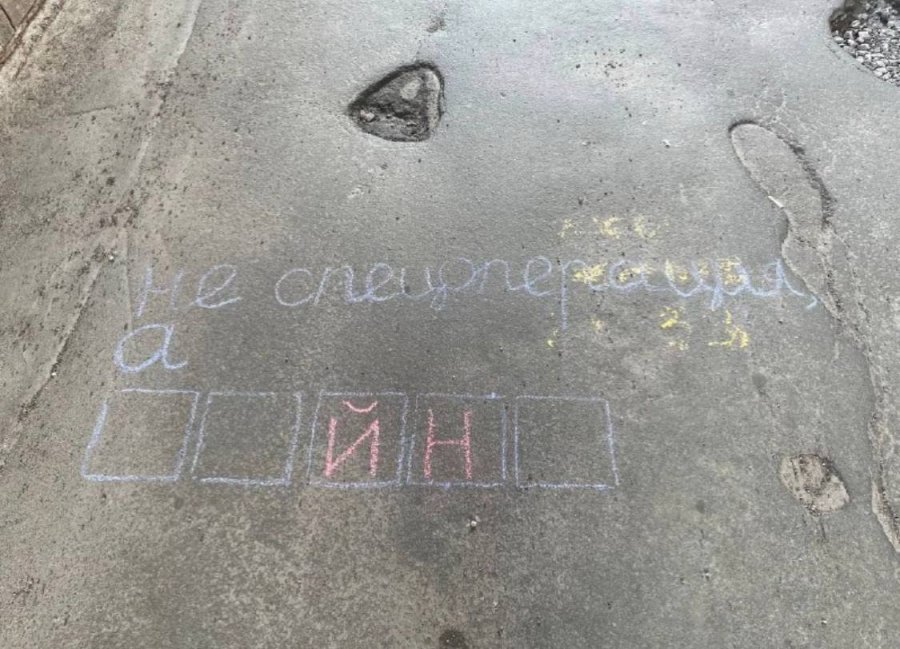
*
The Vologda City Court (Northwest Russia) fined Ivan Belikov, a resident of the city, 30,000 roubles for “discrediting” Russia’s armed forces (Article 20.3.3, Administrative Offences).
According to the court’s ruling Belikov went to protest in the city centre, holding a white sheet of paper and shouting “No to the War”. He was then arrested. In court he admitted his guilt but explained that it was not his intention to discredit the Russian army: he was interested to test the reactions of the police. Before he was arrested, he clarified, he shouted “We are not alone”; it was when he was being taken to the police vehicle that he yelled “No to the War!”
*
Konstantin Zosin from St Petersburg who now lives in Toronto (Canada) decided to hold a one-man protest outside the city’s 19th-century shopping centre and tourist attraction Gostiny Dvor. He managed to stand there for an hour, holding a placard reading “No to the discreditation of the Russian army, no to the War”. During that time, says Zosin, dozens of people thanked him and shook his hand; one person only hurled abuse and a young woman told him she supported the “special operation”.
After the hour was up the police came and arrested him. They were not aggressive, Zosin commented, and one apparently said he was not opposed to such protests. Nevertheless, Zosin was charged with “discrediting” the Russian army and later fined 30,000 roubles. In a long post on Facebook he described his protest and the reason why he felt it important to speak out.
*
In South Russia (Krasnodar Region) unidentified individuals destroyed a banner in support of the war against Ukraine by setting it alight. See the video.
*
The FSB in Ingushetia (North Caucasus) have opened a third criminal case against Izabella Yevloyeva, chief editor of the Fortanga Telegram channel, for spreading “fake news” about the actions of Russia’s armed forces (Article 207.3, Criminal Code).
This time the charges were brought after FSB officers in Ingushetia supposedly found “fake news” in a report published on the Telegram channel on Tuesday, 26 July. That day Fortanga wrote about the Russian army’s losses in Ukraine and the explosion at the shopping centre in Kremenchug.

*
A pensioner from Medvezhegorsk (Karelia, Northwest Russia), was fined 20,000 roubles for “discrediting” the Russian army (Article 20.3.3). The pretext for the charges were two comments Galina Ispodina posted on the internet. [Old-age pensioners in Russia currently receive 16,900 roubles a month, ed.] In particular, Ispodina wrote that she could see no lines outside enlistment & recruitment offices (voenkomat) of young people queuing up “to be cannon-fodder in a neighbouring country.”
*
In the past week, Alexander Pravdin, a 73-year-old activist from Northwest Russia’s Leningrad Region, was arrested because of a poster he displayed on charges of stirring up ethnic hatred (Article 282, Criminal Code “Incitement of hatred or enmity”). The poster read “Russians, you are savages”.

Apparently, criminal charges were also brought against his wife, Gulya Alimardonova for using violence against a police officer (Article 318, Criminal Code). Pravdin said to the Bumaga media outlet that law-enforcement officers had told him she would be charged. The police who escorted her husband to the police station asked Alimardonova to accompany her husband. She refused, fearing that they would “do something” to Pravdin. In response, says Pravdin, the police “sprayed tear gas straight into her eyes”, after which everyone in the apartment felt unwell. Pravdin then suffered a hypertensive crisis and was taken to hospital.
Тhe six police officers threw Alimardonova to the floor and put handcuffs on her before taking her to a police cell. “… it seems that she grabbed one of the policeman by the arm,” says Pravdin. The police qualified her behaviour, says the activist, as “the use of violence against a representative” of the regime.
Pravdin was due to stand trial on Thursday 28 July, but the case materials were not accepted by the courts and the hearing will probably be deferred. His wife Alimardonova was released from the SIZO (investigation & detention centre) 48 hours after her arrest. A local hospital recorded numerous blows and bruises all over her body.
A long piece about Pravdin, who produces opposition and anti-war samizdat––in the small town of Siversky (Leningrad Region), was published by the Bumaga website.
*
Bumaga has published an interview with a 25-year-old woman from St Petersburg who transformed her 900 photos of anti-war protests into a collage.
The young woman, who prefers to remain anonymous, describes how she made the collage, why it helps ease the pain of what’s happening today and whether she fears reprisals.
*
Unidentified assailants hung a funeral wreath and the letters Z and V on the door of an activist in Kaliningrad (Northwest Russia). Kirill Sukhorukov, leader of the “Kaliningrad will sack Putin” campaign told OVD-Info that he found a poster, “Be afraid, Traitor”, the wreath and the letters Z and V when he returned home on Monday 25 July. The same people had printed off two photos of Sukhorukov, one of which was crossed off in red.
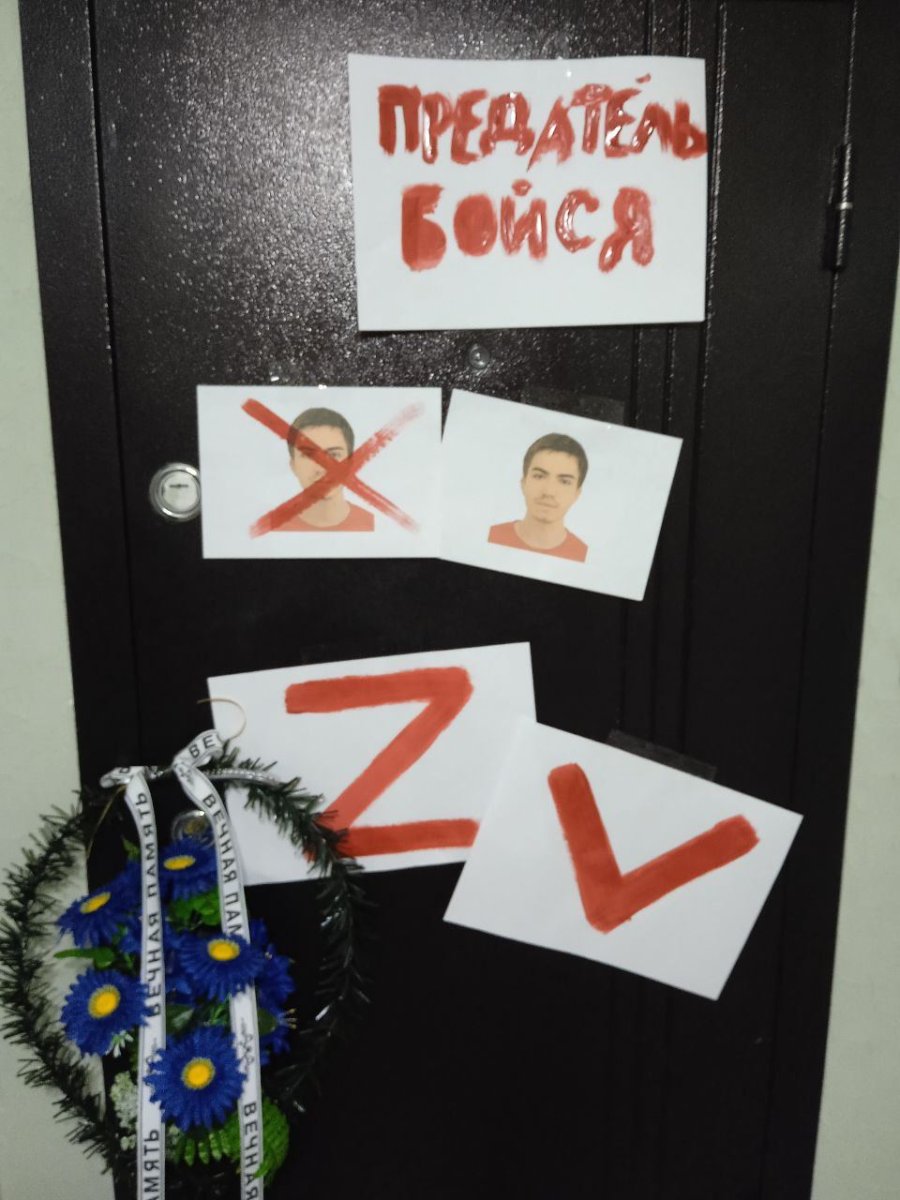
*
At the end of April unidentified assailants drew the letter Z on the car and gates of the 7x7 Horizontal Russia correspondent in Penza (Volga Federal District) and wrote “Here live Ukrainian Nazi accomplices”. In response, the journalist turned the gates into a work of art to which anyone could add or draw what they wanted.
For details, see the video on the 7х7 website.
*
A journalist in the Urals learned from a report by the TASS news agency that he had been fined 100,000 roubles for “discrediting our soldiers”.
*
Vladislav Postnikov, chief editor of the Evening News (Vechernye vedomosti) internet newspaper, announced that he had neither received a report of the charges nor a summons to appear in court. Only on Wednesday 27 July did his newspaper learn of the fine after journalists from the Kommersant daily newspaper (Urals edition) asked the court for information. They themselves hear about the fine from a report by TASS. The court refused to explain to the newspaper why Postnikov was being fined.
The Evening News online newspaper (based in Yekaterinburg) has been fined twice before under Article 20.3.3. On the first occasion the court fined the journalists 150,000 roubles for a post decorated with the stickers of artist Leonid Chorny. The second time the newspaper was fined 200,000 roubles for a total of 54 articles in which the journalists referred to the “special operation” in Ukraine as a war.
*
It has been suggested that a Chechen fined for publicising anti-war slogans should be sent to fight in Ukraine. Artur Ilyaskhanov was fined 32,000 roubles for discrediting the army and for petty hooliganism. In a shop in Nizhnevartovsk (north Urals), a city to which he moved to earn some money, Ilyaskhanov broke two bottles of beer and shouted slogans in support of Ukraine.
The representative of the Chechen Republic in Yugra (Khanty-Mansiysk District, Urals), Abbas Abdulkhazhiyev told the NEFT news website that the Chechen diaspora intended to speak to Ilyaskhanov and suggest that he go to the war zone. “If he expresses such a wish, we shall send him there,” said Abdulkhazhiyev. “If he is killed, he will die a hero. If not, he will return a normal person.”
*
It took inhabitants of Cheboksary (Chuvashia, Volga Federal District) four days to raise 35,000 roubles to pay the fine of Alexei Lapshin, a local blogger. Subscribers to the “Chuvashia is Angry” Telegram channel collected the money.
In April, a court fined Lapshin for “discrediting our soldiers” because of a video he posted on YouTube, calling on soldiers “to act honourably”. According to “Chuvashia is Angry” Lapshin is presently making video clips about drivers’ poor behaviour on Russian roads.
The court also fined local businessman Lev Mozheiko 30,000 roubles for his comments on Lapshin’s video under Article 20.3.3 (discrediting the Russian army).
Sophia Pugachova who banned the use of Z and V will again appear in court
The first hearing was due to take place on Monday, 1 August. The judge was considering the charges brought against the head of the Norvezhsky district administration (Pskov Region, Northwest Russia) for discrediting the Russian army. Previously, the court refused to consider the case and returned the case materials to the police.
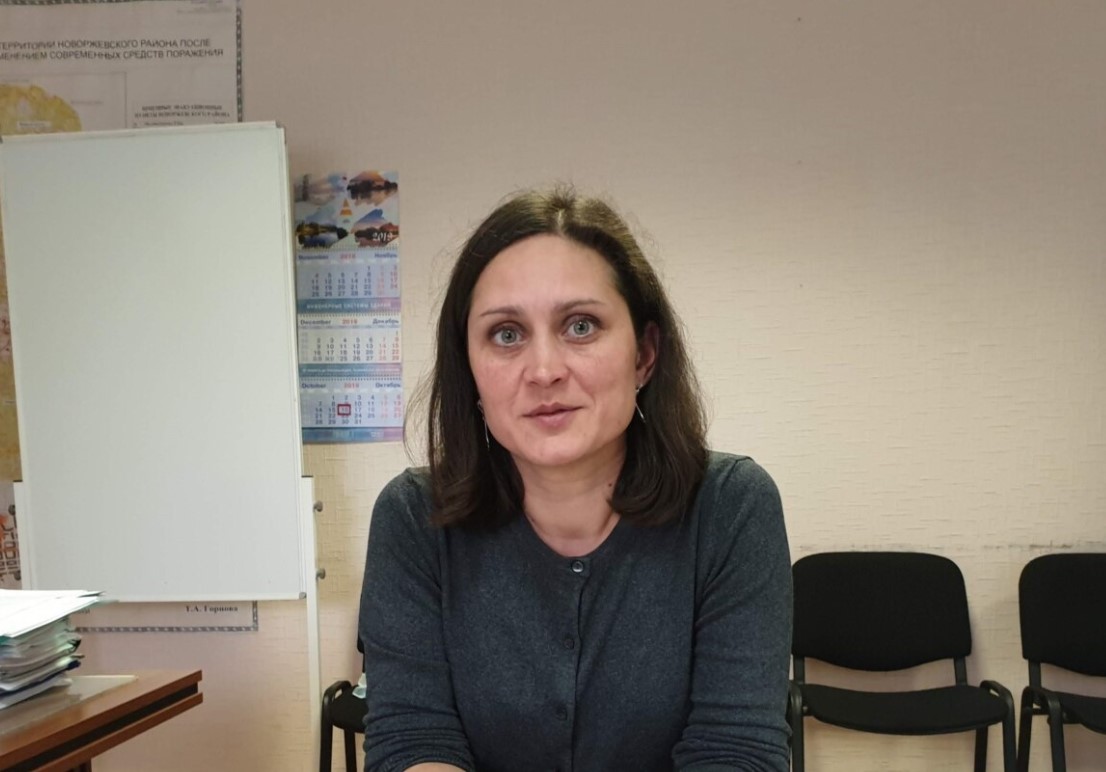
In June this year Sophia Pugachova ordered that the symbolic letters Z and V be removed from the district community centre because they were not appropriate as part of the “Russia Day” celebrations (see 11-16 June Digest [E]). The police then came to see her, confiscated some items of equipment and, following complaints by her colleagues, charged her with “discrediting” the Russian army.
The Zemsky congress judged her case to be political and demanded that the police should not interfere in the work of the municipal authorities. Pugachova represents the liberal Yabloko party and has been head of the district administration since 2019. She has been encouraging the district to manage its own affairs and has appealed to its deputies to vote according to their conscience. The 7x7 Horizontal Russia website has described how this former housewife has been giving the administration a human face.
*
Victoria Petrova, accused of spreading “fake news” about the Russian army (Article 207.3, Criminal Code), has been further remanded in custody until Tuesday, 30 August, reports the “Gentle Force” Telegram channel.
28-year-old Petrova was arrested in St Petersburg on 6 May this year and was sent to the Investigation & Detention Centre the following day. The reason cited was a post with a video on the Vkontakte social network criticising Putin and military actions in Ukraine. According to her lawyer, the post was published on 23 March and taken down two days later. Read an interview with Petrova’s lawyer on how long a case may be investigated and the inconsistencies seen by the defence.
The 150th day since the war began
Last Sunday, 24 July, marked the fifth month since Russia launched its aggressive war against Ukraine. The Saturday before, 23 July, was the 150th day since the war began.
On Sunday, 24 July, it was planned to place flowers at the Wall of Sorrow in Moscow (on Sakharov Avenue) between 1 and 3 pm as a protest against the war in Ukraine and in support of Russia’s many political prisoners. (The Wall of Sorrow was officially opened on 30 October 2017 in remembrance of the victims of political repression.)
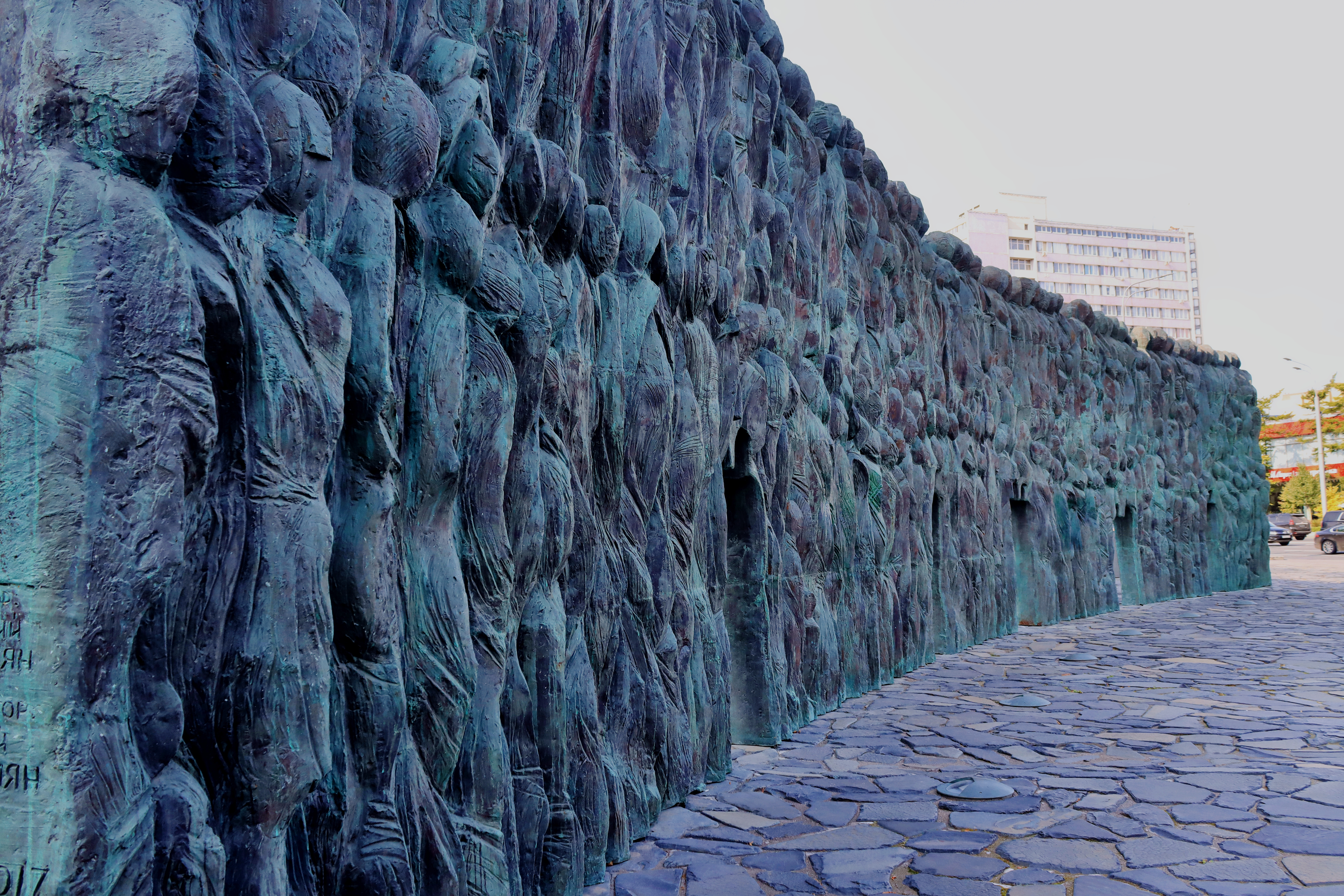
The protest was effectively halted but two young women came with their own flowers and laid them at the Wall of Sorrow. The police arrested them; later they were released without charge.
After 3 pm a brave young woman called Tatyana decided to unfurl her poster at the Wall: “Peace is founded on friendship and love not blood and we should cherish it!” it said. She was well aware that she would be arrested on the spot. As soon as she unrolled the poster two police officers grabbed her and took her to the paddy waggon. Correspondents from RusNews and Activiatica.org managed to film the protest.
All those arrested were taken to the Krasnoselsky police station. An OVD-Info lawyer came to help Tatyana: she was charged with “discrediting the Russian armed forces” (Article 20.3.3). The others were all released without charge.
A new issue of FAR’s newspaper
The Feminist Anti-War Resistance (FAR) has issued No 7 of its anti-war newspaper, Women’s Truth (Zhenskaya pravda).
FAR activists suggest that their like-minded colleagues in other parts of Russia should print off copies of the paper and distribute it. The newspaper can even be copied on an ordinary computer printer.
The new issue contains
– an interview with social anthropologist Alexandra Arkhipova about political anecdotes as a form of political struggle;
– an account of the harassment and persecution in various towns and cities of schoolteachers and street artists for their anti-war views (source, Mediazona);
– excerpts from activist Sasha Skochilenko about her time in the Investigation& Detention Centre (SIZO);
– an article about the laws on “fake news” and “discrediting the Russian army”;
– an account of the Rebellious Grannies group, activists who tried to enlist instead of their grandsons;
– excerpts from the diary of Jana, a young Ukrainian woman, telling how the war has affected her life;
– instructions as to how to fight the symbol Z on the façade of buildings;
– an anti-war playlist;
– political anecdotes, a selection of news, and readers’ letters.
The newspaper is distributed together with safety instructions. The entire issue can be seen and read here.
Art against the War
Sasha Skochilenko will remain in the Investigation & Detention Centre (SIZO) until Wednesday, 1 September.
Skochilenko’s lawyer Jana Nepovinova has again drawn attention to the lack of regard for her client’s special needs as a coeliac. She has an intolerance of gluten but cannot maintain her diet in the Investigation & Detention Centre (SIZO). Elementary sanitary norms are not observed there, added Nepovinova – recently Sochilenko was given a mug of tea containing a cockroach.
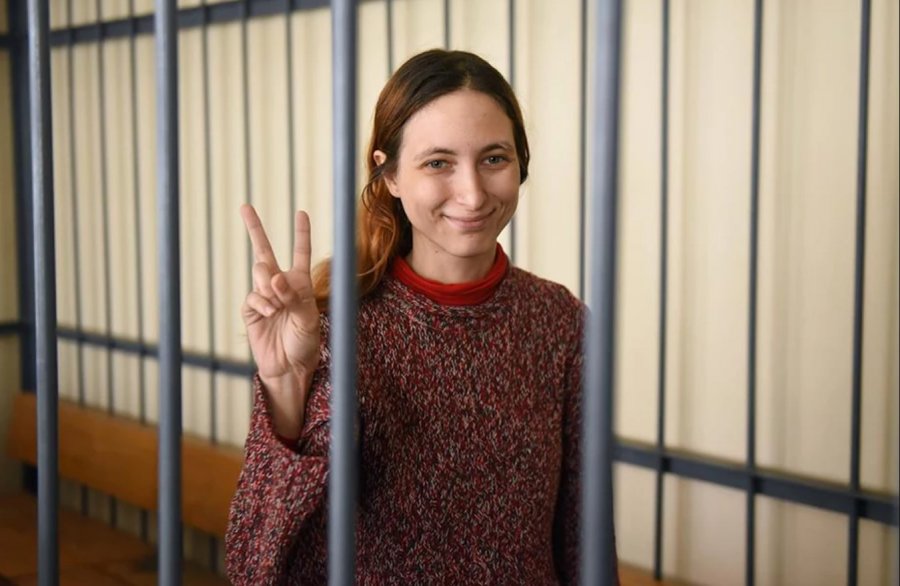
Skochilenko needs medical attention, Nepovinova continued, including a thorough-going cardiac examination. This was confirmed by a cardiologist called to testify at the recent hearing.The court ignored his words when it extended Sochilenko’s term of custody.
Sasha Sochilenko is an artist, musician and formerly worked with the Bumaga newspaper. She is charged (Article 203.7) with spreading “fake news” about the Russian army by replacing supermarket price tags with anti-war statements. She faces up to ten years imprisonment in a penal colony.
The interview with her lawyer may be read here.
*
An artist calling himself Hyoshi has published a new anti-war work on Instagram. The “Lada Coffin” is a response to news that one family of a Russian soldier killed in Ukraine bought a Lada Granta vehicle with the money received as compensation for his death. A meme is circulating on the internet about this: “Thank you, Grandpa, for beating the Germans; thank you, Son, for our new car.”
*
New street art has appeared in the centre of Yekaterinburg (Sverdlovsk Region, the Urals).
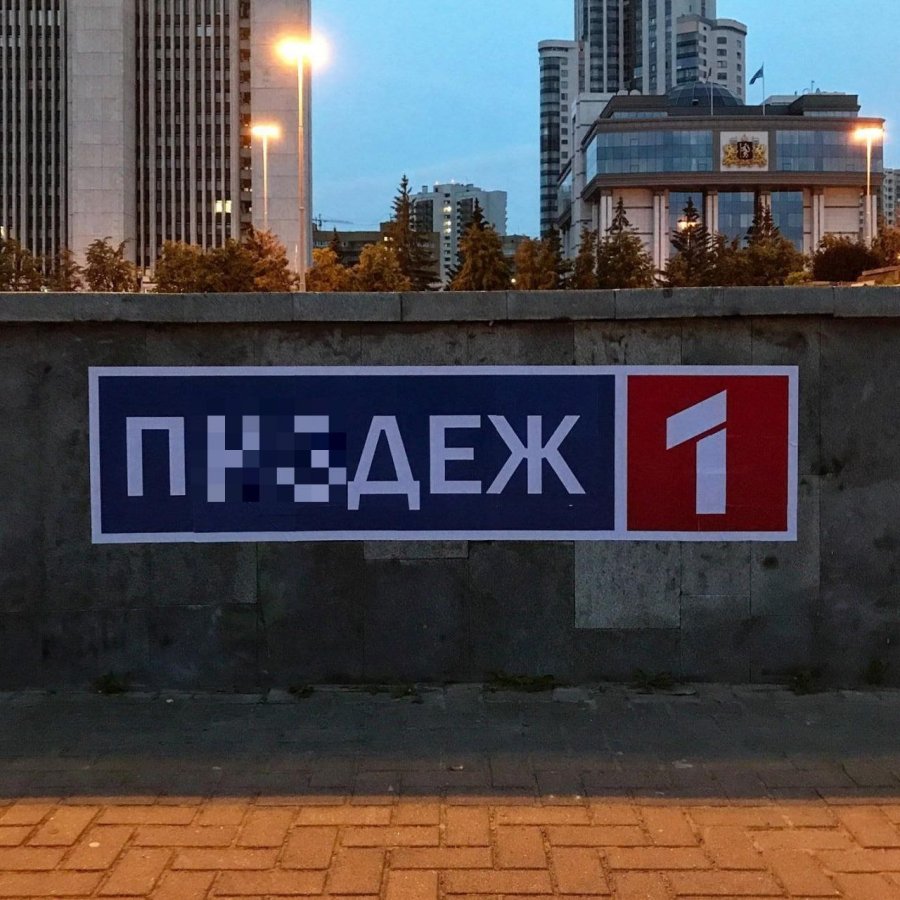
The work by artist xbfmthx closely resembles the logo of the State-owned TV Channel One but spells a common obscenity.
*
Police are investigating the well-known video blogger and stand-up comedian Daniil Poperechny who is suspected of “discrediting” the Russian armed forces.
They were acting on a complaint by a certain Maxim Vasilyev, who wrote that Poperechny was not in favour of the “special operation” (in Ukraine) and was publishing dangerous posts on Instagram. Poperechny declared that he was in Russia and was not discrediting the Russian army.
The comedian asked the FSB to check on a video in which he is shown dancing with a dog. This week he posted a long interview with Yekaterina Shulman.
*
The case of musician Yury Shevchuk, leader of DDT, will be heard on Friday, 5 August, by a court in Ufa’s Soviet district (Bashkortostan, Volga Federal District). This was announced by the united press service of Bashkortostan’s courts.
Shevchuk was charged with “discrediting” the Russian armed forces after a concert by DDT in Ufa on 18 May this year. There the singer told the audience, “Our motherland, friends, is not the President’s arsehole which we must kiss and slobber all over”. Meanwhile, other concerts by DDT in various parts of Russia are being delayed for a variety of reasons.
The organisers of the Black Earth Festival officially confirmed to a journalist from Voronezh News that DDT’s performance at the festival had been cancelled. The group B-2 have also been removed from the festival’s headline acts. The organisers refused to offer any reason.
Earlier information about DDT’s performance disappeared from the festival website, although in May the organisers had announced that the group would be among the performers.
Since the end of May musicians who have spoken out against the war have begun to be harassed and persecuted on Telegram channels. After which their shows in Russia have been cancelled. The Bumaga news website has written about this. It has also published an interview with the organiser of the Stereo Summer festival about festival without foreign performers and the pressure on Russia’s bands.
*
A gang of policemen stormed a gig by the Anacondaz rock group in Perm (Volga Federal District). Previously the group had issued anti-war statements. Its members tried to get round the ban by not announcing the group’s name.
A performance by the Anacondaz was cancelled in Yekaterinburg (Urals) at the insistence of the police.
The group’s soloist Artyom Khorev said on Twitter that the Anacondaz might appeal to the prosecutor’s office and challenge the decision of the police. They had been warned, Khorev said, that they could be placed in detention for 15 days “for incautious actions”. It was not explained who the police had in mind. The location of their gig was kept a secret until the last moment. The address was to have been sent to all who bought tickets.
In June, the Anacondaz planned to perform at the Excellent Festival (in Sankt-Peterburg) but the show was cancelled. They have now rescheduled some of their July gigs (in Voronezh and Rostov-on-Don) for January 2023.
They were added to the list of banned groups because of their anti-war statements.
Support for anti-war protestors
The Russian Committee for Freedom has published instructions what to do if you are accused of “discrediting” the Russian armed forces.
Anti-war campaigns and projects
The Bumaga periodical has issued an English-language podcast called “Russian Resistance” [E]:
“This is Bumaga’s first project in English. In it we describe the people who are protesting against the war and the regime’s repressive acts. Why are Russia’s citizens protesting today? Against what? How protests are being suppressed and why there’s still hope.
“We seek answers to these questions with feminist activist Darya Serenko; Maxim Pokrovsky, leader of the Dead Leg (Nogusvelo) band; Maria Alyokhina of Pussy Riot; and others. We begin with an episode about Sasha Skochilenko, the musician and activist from St Petersburg. This is real Russian Resistance. For her protest with price tags in a shop Sasha Skochilenko faces up to ten years imprisonment, but even at the Investigation & Detention Centre (SIZO) she continues to protest together with her girl-friend Sonya, our guests tell Sasha’s story.”
You can listen to “Russian Resistance” [E] on Apple Podcasts, ЯндексМузыке, Spotify, Castbox and YouTube
*
On Friday 29 July, Meduza published a long piece [E] about the persecution of those who make anti-war statements by the Russian authorities.
The sub-title of the Russian version of the article “Lay on the side-walk naming towns and cities in Ukraine” is a phrase taken from a charge sheet. The article says that by the end of July, says the article, OVD-Info and Mediazona calculate that “3,400 cases had been brought under Article 20.3.3 (discrediting the Russian army)”.
The Meduza news website is blocked in Russia and presently operates from Latvia.
*
Many in Russia today support “quiet” forms of protest. They wear green sashes and ribbons, some bearing anti-war captions; they write graffiti; and anti-war stickers may be found in towns and cities across the country.
On his Telegram channel journalist Roman Super frequently publishes photos of such protests .
*
The Green Sash movement constantly posts photos of green sashes and anti-war stickers on its social networks, especially its Telegram channel.
*
The Vesna (Spring) has published a guide to “visual protest” in which it makes a great many suggestions: leaving books containing anti-war notes in public places; writing anti-war captions on trees; and so on.
*
Many people are currently wearing the Peace sign. Young women wear ear-rings and pendants bearing the sign, and also blue & yellow bracelets, blue & yellow ear-rings, or badges and brooches with the Peace sign.

Court shows unexpected leniency
For the first time ever, the measure of restraint imposed on someone accused of spreading “fake news” about the Russian army (Article 207.3, Criminal Code) has been eased.
The Vyborg district court in St Petersburg let Boris Romanov out of the Investigation& Detention Centre (SIZO) on condition that does not engage in certain activities. Romanov is forbidden to meet witnesses to his actions, take part in mass gatherings or use the internet.
Anti-war statements on the internet
Police in Moscow are searching for the bold fellow who called his home Wi-Fi network “Glory to Ukraine”.
A Z-patriot from the same multi-storey apartment block reported it to the police. She had picked up a signal called “Glory to Ukraine” in her very own apartment. A police squad arrived and confirmed that the network existed but were unable to establish where the signal was coming from.
*
A historian from Barnaul (south Siberia) has been fined for his sad responses to anti-war posts online. Alexei Argunov teaches philosophy and history. He added the comment “This saddens me”, to a post with a video appeal by Arnold Schwarzenegger. He added exactly the same comment to a report that a Yabloko deputy had been fined for his anti-war stance. Argunov added the comment, “Quite right” to a post by an acquaintance who asked that he should unfriend all those who support the war in Ukraine.
The police summoned Argunov to the station and requested that he write an explanation of his actions. As Argunov explained on the Siberian Realities website, the police had been assigned the task by the FSB.
“The police showed that they understood it was not a serious matter, even rather silly," the historian told journalists. As a result, Argunov was charged, and the court fined him 30,000 roubles: he teaches at a further education college and his monthly salary is 17,000 roubles.
*
An activist in Pskov (Northwest Russia) has been fined 30,000 roubles for creating an anti-war avatar. As reported in the previous digest ([E], 17-27 July) The Pskov City Court found Igor Batov guilty of “discrediting” the Russian army. The reason was an avatar Batov used online, carrying a caption against the Media Oversight Agency (Roskomnadzor) and a post approving the actions of a soldier who refused to fight in Ukraine.
Statistics
Since the beginning of March, the police have charged more than 3,000 Russian citizens with “discrediting” the army (Article 20.3.3, Administrative Offences). The Net Freedoms project calculates that courts have issued fines in 92% of cases.
Only 90 cases were closed; the courts returned another 38 charges to the police for further investigation. On average, the police have issued 35 charges a day for discrediting the Russian army.
By the beginning of June, the courts had successfully obtained only 27 million roubles in fines from Russian citizens, according to the figures of OVD-Info. In a little more than a month that figure grew to 50 million roubles.
Politicians persecuted for anti-war views
The Novosibirsk deputy Helga Pirogova has left Russia. She was charged with spreading “fake news” about Russian soldiers (Article 203.7, Criminal Code). The public learned that she had gone to Kazakhstan from AST-54, the “Politics Today” Telegram channel, and the Sibkrai periodical.
Pirogova herself did not confirm that she had left the country. She read what journalists were saying @sibirmedia but did not reply. The Siberian Realities website reported that Pirogova was not answering emails or her telephone.
On 22 July, the Investigative Committee, acting on the instructions of its director Alexander Bastrykin, opened a case against Pirogova under Article 207.3 of the Criminal Code (circulating “fake news” about the Russian army) The pretext was a tweet in which Pirogova commented on a text published by Mediazona about the funeral of some soldiers. The vice-speaker of the Novosibirsk Legislative Assembly reported her to the authorities. Her colleagues say that Pirogova is pregnant.
Update: TASS reported that the law-enforcement agencies of the Novosibirsk Region would put out a warrant for Pirogova’s arrest if she did not appear for questioning.
The “Gentle Force” women’s political movement demanded that Bastrykin end his organisation’s harassment of Helga Pirogova. In a letter to Bastrykin, “Gentle Force” activists spoke of the deputy’s achievements in the Novosibirsk City Duma: she had ensured that work on underground passages and major repairs to courtyards and roads were carried out round the clock. With her support the Novosibirsk City Museum was extensively repaired. She also exposed corrupt practices concerning plots of land owned by the city. All the work Pirogova had done was transparent and public, said a spokesperson for the “Gentle Force” movement.
*
An arrest warrant has been issued for politician Leonid Gozman.
After the invasion of Ukraine, he left Russia. In mid-June, however, he returned to the country. His details appeared in the MVD database of wanted individuals and on 29 July he was arrested in Moscow.
OVD-Info, relying on Gozman’s lawyer Mikhail Biryukov, reported that Gozman was arrested at the Frunzenskaya metro station in the Russian capital. On 15 July, it became known that Gozman would face charges under the article concerning the failure to report a change in status in good time to the migration service. Supposedly, he failed to inform the police that he had obtained Israeli citizenship in 2018.In May 2022, Gozman was declared a “foreign agent”.
Leonid Gozman is president of the Union of Right Forces, a political movement active in Russia between 1999 and 2008.
Talking to Radio Svoboda Gozman explained that he had returned to Russia in June because it was for him “a moral rather than a political choice” and he quoted the poet Naum Korzhavin: “Every day I wake up in a foreign country”. Gozman commented:
“I don’t want to do that. This is my country. Why the hell should I take orders from people who, in my view, are destroying the country?”
Soldiers and their families
More than a hundred Russian families have written to Vladimir Putin, demanding that he find their children who have gone missing in Ukraine.
As the Northern Realities website of Radio Svoboda reports, families from various parts of Russia have sent a letter to the president via his official reception. In it they demand that their missing relatives be added to the list of soldiers who have gone “missing in action”. The families say that their children are not being sought since their names have not been added to the official register. Instead, they are given contradictory information and, as a result, are forced to search themselves and find evidence that their relatives are POWs or have been killed.
At the end of June, soldiers’ wives in Buryatia made an appeal to Alexei Tsydenov, the head of the east Siberian republic demanding that he bring their husbands home. After their video appeal was broadcast one of the wives deleted her social network accounts and no longer answers phone calls.
*
At least 1,793 Russian soldiers have declared that they do not want to fight.
According to figures compiled by rights activists and the media, the leading regions within Russia are in the North Caucasus and east Siberia:
Stavropol Region (Krai) — 311
Dagestan — 300
Buryatia — 170
Recruiting activists as informers
The Investigative Committee is ringing up activists arrested at anti-war rallies and suggesting that they testify against the Vesna movement.
As reported by the movement’s Telegram channel and Department One Telegram channel the Investigative Committee has rung no less than four Petersburg activists and suggested that they serve as witnesses in a case against Vesna. All four were arrested at anti-war protests in late February.
The investigators proposed that they testify against the movement’s participants and wanted to learn more about Vesna’s role in organising protests in St Petersburg. The Investigative Committee referred to Vesna as “bad guys who lure people out onto the streets”. Vesna will be prosecuted under Article 239 (Criminal Code) for creating an NGO that violates the rights of citizens.Six people have been charged in the case.
It was in the run-up to 9 May, Victory Day, that the mass harassment of activists began.
This digest was compiled by Memorial volunteers using a variety of websites and Telegram channels (аll sources are in Russian unless indicated [E] otherwise): 7x7 Horizontal Russia, Bumaga and its Telegram channel, Chuvashia is Angry, Feminist Anti-War Resistance, Gentle Force, Green Sash, Meduza [E], Mediazona [E], Net Freedoms, Northern Realities, OVD-Info, Siberian Realities, Vesna, Visual Protest, World Protest and other sources.
Translation, John Crowfoot





